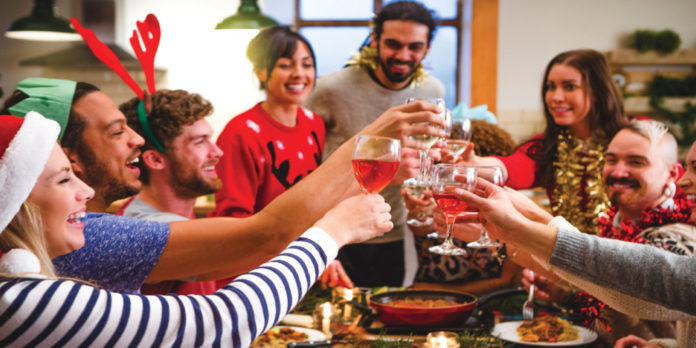Drinks are a major part of Christmas celebrations. Charlotte Buxton looks at what consumers want to drink over the holidays, and what you can do to help your customers.
The festive period sees friends, family and work colleagues coming together to celebrate Christmas and the New Year. But consumers are more discerning than ever about what they drink, so you need to make sure you are offering your pub, bar, restaurant and convenience store customers the right products.
Alcoholic and soft drinks are a major part of any festive celebration, so on- and off-trade businesses will be looking to maximise sales over Christmas and the New Year period.
Here we explore how you can help them do that and maximise profit in the process.
Trading up
Alcohol is a major part of any wholesaler’s Christmas offer, and bars, restaurants and retailers have to trade customers up during the festive period to make the most of the opportunity. Dan Harwood, head of wine education for Halewood Wines & Spirits, says: “When people come together to celebrate over the festive season, they are more inclined to treat themselves and spend more. Wholesalers should capitalise on this by stocking up on high-quality sparkling options and premium wines.”
Red wine is significantly more popular at Christmas, according to Shaun Heyes, channel director at Treasury Wine Estates (TWE).
“It is important you have more premium red wines on-shelf for this occasion – wines that might sit in the £8 to £12 range in particular,” he says. “Wolf Blass Yellow Label and Silver Label are excellent examples of this.”
Ben Smith, head of communications at Concha y Toro UK, recommends stocking brands that consumers will recognise and buy with confidence: “Malbec is a red wine variety that is getting ever more popular, growing at more than 43% year-on-year in convenience,” he notes.
Shoppers trade up when buying beers and ciders at Christmas, too. Cider-maker Sheppy’s managing director David Sheppy says: “Consumers are drinking less in terms of volume but better in terms of quality. Discerning drinkers are favouring smaller, traditional producers. Quality and authenticity are vital in helping to drive the growth as ‘real’ brands bring heritage, fuller flavours, traditional methods and knowledge.”
For your on-trade customers, meanwhile, premium spirits are essential so that they can make the most of consumers’ demand for cocktails over Christmas. Mark Harris, channel director for Pernod Ricard UK, says: “We know a £30.1m opportunity exists for cocktails this Christmas.
“However, this number can rise to as much as £50.7m if outlets are able to encourage trade-up into premium spirits.”
Gifting
Many Brits will be going to convenience stores in search of gifts over the festive period, so you need to make sure retailers can come to you for drinks that are appropriate as presents.
Faith Holland, head of category development at Diageo GB, notes that while some shoppers buy gifts at the last minute, grocery shopping for Christmas starts before December for up to 60% of households: “Gifting is a huge driver of footfall at Christmas, with more than half of shoppers on this mission going in-store with the main purpose of buying alcohol. Customers are also more likely to trade up to higher quality and more premium spirits brands over the festive period,” she adds.
According to TWE’s Heyes, one of the big growth areas in the wine category at the moment is ‘male millennial’ wines – products targeted at male shoppers aged between 18 and 34. He recommends stocking wines such as 19 Crimes and Gentleman’s Collection to help your customers make the most of this trend.
Seasonal specialities
Seasonal drinks, such as mulled cider, are popular at Christmas. You should also stock craft and premium beers to help your customers cater for consumers wanting to try something new.
The way such products are stocked in-depot can help encourage retailers to make a purchase. Craig Ogden, director of Carlsberg-owned House of Beers, says: “To make the most of the available space, wholesalers should look not only to products that align with consumer trends, but also consider using layouts that replicate the ones that their retailer customers may be using.”
“If retailers are dedicating more space to craft and premium, then wholesalers should be doing the same. This will help to manage stock levels and inspire additional sales.”
Last minute
With the run-up to Christmas Day occurring over a weekend, your customers have an extra opportunity to boost sales, so make sure you have the stock they need to make the most of it. In fact, last-minute shopping will play a big part in sales throughout the period.
TWE’s Heyes says: “Wine plays a significant part at Christmas parties – so, for example, lots of shoppers will visit your customers’ stores for last minute top-up visits. So make sure you communicate the importance of having a chilled section for white and rosé wines at the front of the store.”
Although many people will be coming in looking for premium products, most will want other products, so a balance is essential. Diageo’s Holland says: “With 69% of alcohol sales coming from shoppers spending £10 or less, fractionals are key to driving spirits sales through unlocking the ‘Something for Tonight’ mission.”
Soft drinks
While the Christmas party period is typically most associated with alcohol, wholesalers should not forget soft drinks.
Carol Saunders, head of customer marketing at Highland Spring Group, says: “Many people have reduced the amount of alcohol they consume and are using products such as sparkling and flavoured waters as an alternative.
“According to the Office for National Statistics, the number of people stating that they do not drink alcohol at all has been increasing since 2005 and by 2016, 10.6m people (20.9% of the adult population) said that they did not drink alcohol.”
Adrian Troy, marketing director for AG Barr, agrees: “Soft drinks are key to the profit opportunity, as consumers look to stock up on their favourite brands, including Irn-Bru, Rubicon and the Barr ranges. Large-pack formats and multipacks are in particularly high demand as shoppers prepare for family gatherings and parties.”
These ‘drink-later’ formats grew by 7% in the final three months of 2016, according to Mark Sterratt, market, strategy and planning director at Lucozade Ribena Suntory. He recommends catering not just for adults, but children, too, with products such as Ribena Squash and Ribena Minis; he also suggests stocking products such as Orangina to encourage shoppers to trade up.
Barr’s Troy says it is important that wholesalers remember healthy options: “The soft drinks market has evolved, with shoppers increasingly looking for greater choice at the fixture.
“However, consumers are not prepared to compromise on taste and a growing number are looking for low- and zero-calorie options with the full flavour they get from regular products.”
Amy Burgess, trade communications manager at Coca-Cola European Partners, notes that cola is the biggest seller in the soft drinks sector – and this is no different during the holiday season: “Worth £135m at Christmas, it is continuing to grow, with 1.26m more shopping baskets containing colas in 2016 than the previous year,” she says.
If wholesalers are going to make the most of all the sales opportunities the festive period has to offer, it’s crucial that they get two things right: marketing and availability.
Martin Spivey, on-trade controller at buying group Landmark Wholesale, says: “Retailers can only shop what’s in-depot and their customers can only buy items if they are available for retailers to stock up on.
“The festive period is the most important time to ensure you have all the right products for retailers to meet customer demand.”
Viewpoints
 Drink recommendations are always well received and we would happily share our seasonal menus with our suppliers and work with them to agree new pairings. Christmas is all about doing something special – our guests are always looking for new festive ideas, so a new wine, champagne or cocktail offer works well.”
Drink recommendations are always well received and we would happily share our seasonal menus with our suppliers and work with them to agree new pairings. Christmas is all about doing something special – our guests are always looking for new festive ideas, so a new wine, champagne or cocktail offer works well.”
Chris Bailey-Lewis, Richardson Hotels, Devon
 “People tend to want quality over quantity at Christmas; they want to have a nice night and not just a cheap one. For example, people will be open to ordering a magnum of champagne – and not just the one with the lowest price. Wholesalers should highlight the quality products they have got.”
“People tend to want quality over quantity at Christmas; they want to have a nice night and not just a cheap one. For example, people will be open to ordering a magnum of champagne – and not just the one with the lowest price. Wholesalers should highlight the quality products they have got.”
Martin Irwin, Wellbourne restaurant, Bristol
 “It would be good if we could get some more promotional glassware and mugs, as people like those at Christmas time and it helps to push the products, too. I would also like to have suggestions for ways to serve drinks that are a bit different and nibbles to go with them.”
“It would be good if we could get some more promotional glassware and mugs, as people like those at Christmas time and it helps to push the products, too. I would also like to have suggestions for ways to serve drinks that are a bit different and nibbles to go with them.”
Sandra Purdy, The Horns pub, Reading, Berkshire
 “Customers are looking for the big names during the festive season, both for themselves and as gifts. It is absolutely critical that we offer more premium lines as customers are more likely to splash out as it is a special occasion. I am always looking for unusual brands that I think my customers will enjoy.”
“Customers are looking for the big names during the festive season, both for themselves and as gifts. It is absolutely critical that we offer more premium lines as customers are more likely to splash out as it is a special occasion. I am always looking for unusual brands that I think my customers will enjoy.”
Nikki Kaur, Drinks Express, Aldridge, West Midlands
Suppliers Viewpoints
 “Wholesalers should help their on-trade customers cater for two drinking occasions. The first is daytime. The typical drinks mix that daytime consumers seek are soft drinks, coffee and mocktails. Operators should look to satisfy three main consumer needs during this occasion: non-alcoholic, long-lasting refreshment and calorie-counting.
“Wholesalers should help their on-trade customers cater for two drinking occasions. The first is daytime. The typical drinks mix that daytime consumers seek are soft drinks, coffee and mocktails. Operators should look to satisfy three main consumer needs during this occasion: non-alcoholic, long-lasting refreshment and calorie-counting.
“The other important drinking occasion is after-work socialising. Younger shoppers are consuming much less alcohol and it is therefore important to cater to the demand for exciting and tasty non-alcoholic options over the festive season. In addition, operators must ensure they have a menu offer for the dedicated drivers of the group, with enticing soft drink options.”
Rich Fisher, category development manager, Red Bull UK









[…] that contain multiple individuals drinks. Companies often also increase their promotion of their ‘premium’ drinks, as people are more likely to treat themselves and their loved ones around the holidays. […]